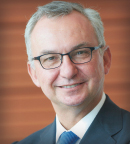
José Baselga, MD, PhD, FASCO
José Baselga, MD, PhD, FASCO, a global innovator in novel cancer therapeutics, led research efforts in his native country of Spain and in the United States, most notably as Physician-in-Chief at Memorial Sloan Kettering Cancer Center (MSK). “My moment of recognition as an oncologist came early, when I was conducting a phase II trial of Herceptin. A woman with advanced breast cancer on the Herceptin arm had a complete remission. I knew then the rules for treating this disease had changed in our favor,” said Dr. Baselga in the documentary The Emperor of All Maladies. Dr. Baselga died on March 21, 2021, at the age of 61.
Early 1980s: Exciting Time for Oncology
Dr. Baselga was born in Barcelona on July 9, 1959. After excelling in science and mathematics during high school, Dr. Baselga followed his ambition to become a doctor and enrolled at Vall d’Hebron University Hospital. During Dr. Baselga’s internal medicine training, he became interested in oncology, seeing it as a discipline that offered challenges and opportunity at once. “It was the early 1980s, and oncogenes were just being discovered. For the very first time, we had the promise that the molecular basis of cancer was going to be found,” Dr. Baselga said during an interview.
Dr. Baselga was accepted for a 3-month elective rotation at MSK. However, his Spanish qualifications were not accepted, so he needed to fulfil his internship and residency programs elsewhere, which he did. He was then granted a 3-year medical oncology fellowship at MSK, which he considered the “opportunity of a lifetime.”
“In the second year of the fellowship, I had to choose a mentor and was very lucky to have John Mendelsohn, MD, then Chair of Medicine, who had produced the first anti-EGFR antibodies. I became involved in laboratory studies on EGFR antibodies and gained grants and ran clinical trials. It was an incredible opportunity that set my career in motion,” Dr. Baselga said during an interview.
Dr. Baselga was offered a faculty position at MSK. However, because of visa restrictions, he was unable to take up the post until a waiver was arranged, which took about 2 years. “In the meantime, I had no license to treat patients, and that was wonderful because I spent all my time in the lab…. And for me, that was transformative,” he noted.
A Research Career Accelerates
After his visa waiver came through, Dr. Baselga assumed his faculty post at MSK, continuing his joint lab and breast service work. He also began publishing and doing groundbreaking work in the clinic and laboratory. By then, Dr. Baselga was married with two children and had planned to stay at MSK, where he was leading the clinical development of EGFR and HER2 antibodies. However, he was given an offer he couldn’t refuse: to head the development of a new oncology center in Barcelona.
“It was a tough decision to leave MSK, but I returned to Spain to build an oncology effort Vall d’Hebron. It was there that I did some of my best translational work, leading multiple clinical trials in an environment where barriers to accrual and execution were less onerous.”
Throughout his career, Dr. Baselga tied together the best of international research efforts, always maintaining close relationships with his colleagues in the United States. He eventually returned to MSK, appointed as Physician-in-Chief, where, among other initiatives, he spearheaded biomarker research for breast cancer. Dr. Baselga resigned from MSK after a report exposed his failure to disclose financial ties with industry in research articles he authored. He noted the omissions were unintentional and promised to amend them.
In 2019, Dr. Basegla joined AstraZeneca as Executive Vice President for Oncology Research and Development. Over the arc of his career, he was a key player in the development of trastuzumab, pertuzumab, lapatinib, alpelisib, and everolimus in the treatment of patients with breast cancer.
Tributes From Colleagues
As word of Dr. Basegla’s death reached the oncology community, his colleagues offered heartfelt tributes. Pascal Soriot, AstraZeneca’s Chief Executive Officer, wrote: “José’s visionary leadership, deep scientific expertise, and strategic insight have delivered so many achievements that will benefit patients’ lives in the years to come. He was more than a colleague; he was a friend and someone I immensely respected and cherished. I will enormously miss having him alongside me and will continue to be inspired by his work and vision. My heart goes out to his wife, Silvia, and his four children.”
Author of the Pulitzer Prize–winning book, The Emperor of All Maladies, Siddhartha Mukherjee, MD, posted: “I am utterly devastated to hear about my friend José Baselga’s passing. Rest in peace.”
Dr. Basegla served as President of the American Association for Cancer Research (AACR) from 2015 to 2016. AARC Chief Executive Officer Margaret Foti, PhD, MD, commented: “Dr. Baselga’s death is a great loss to cancer research. He was a caring oncologist and supportive mentor to a whole generation of physician-scientists. He will be dearly missed through the entire world for his stellar contributions to cancer science and to the improved care of cancer patients.”
ASCO Chief Executive Officer, Clifford A. Hudis, MD, FACP, FASCO, shared his thoughts on Dr. Baselga: “José believed in evidence, had faith in science and translational research, and valued execution. He held himself to high standards and expected the same from others. In my experience over 3 decades, this drive marked everything he did, every day. The world of oncology has lost a true change-maker.”
Dr. Baselga is survived by his wife Silvia and four children Marc, Clara, Alex, and Pepe. His family established a GoFundMe page to raise money for research into Creutzfeldt-Jakob disease. Just one day into the fundraiser close to $170,000 had been raised.

